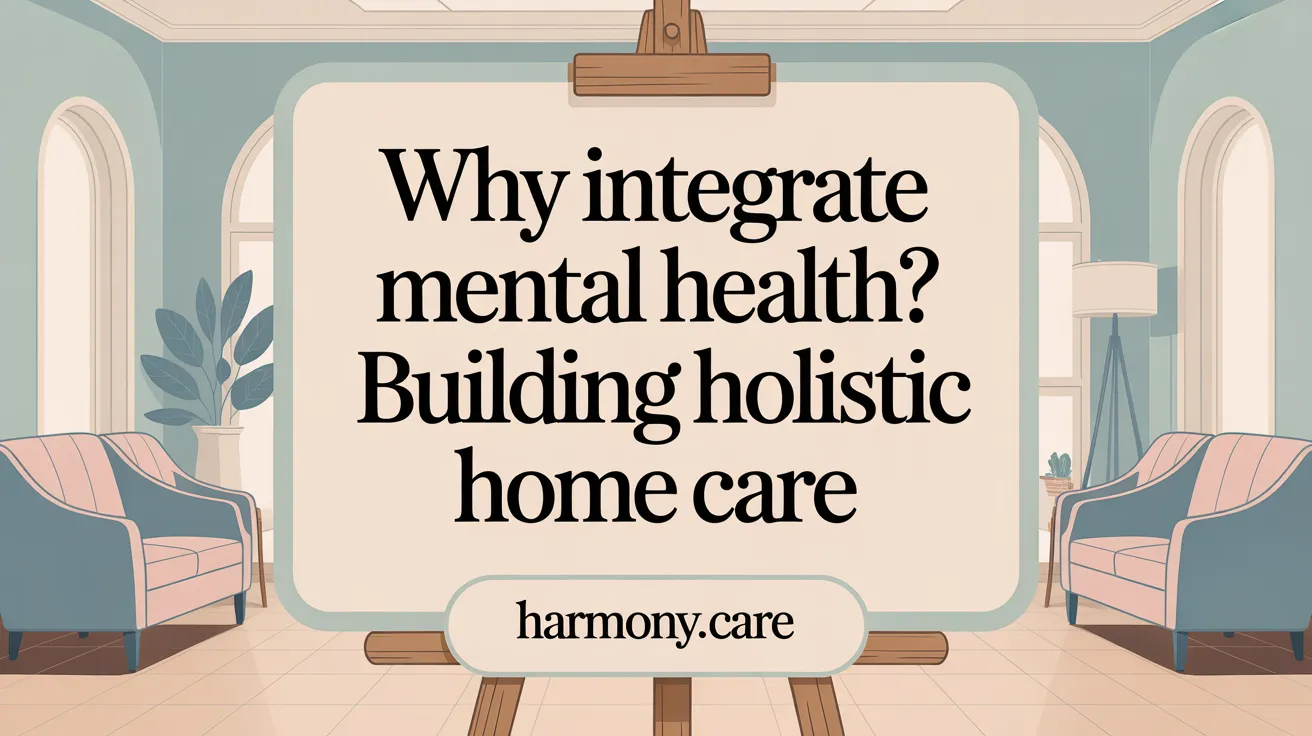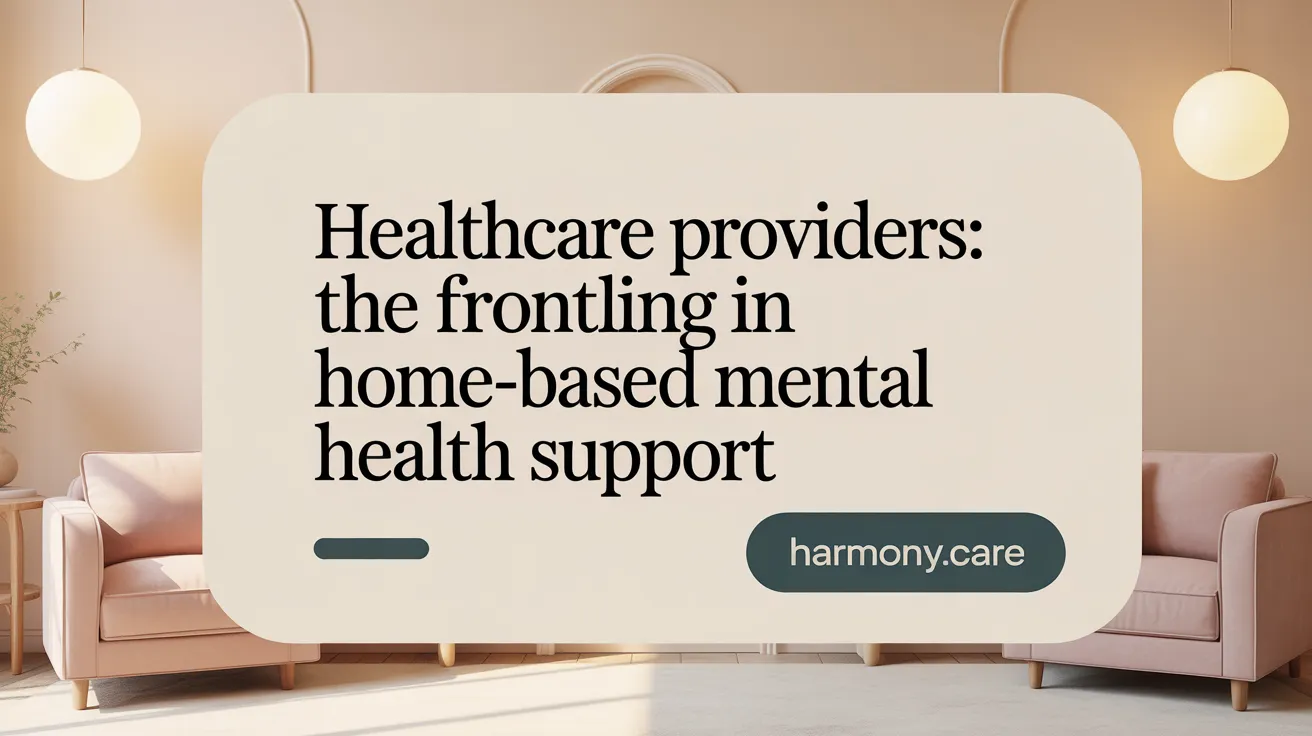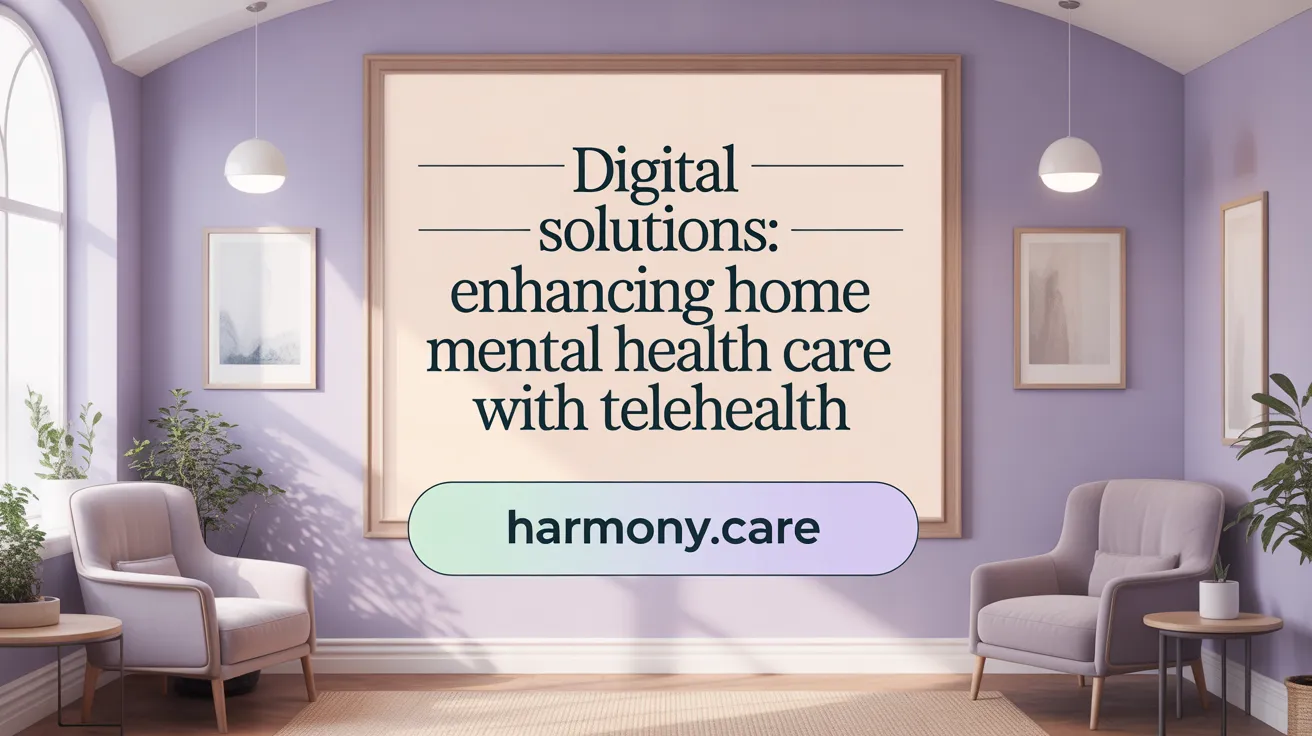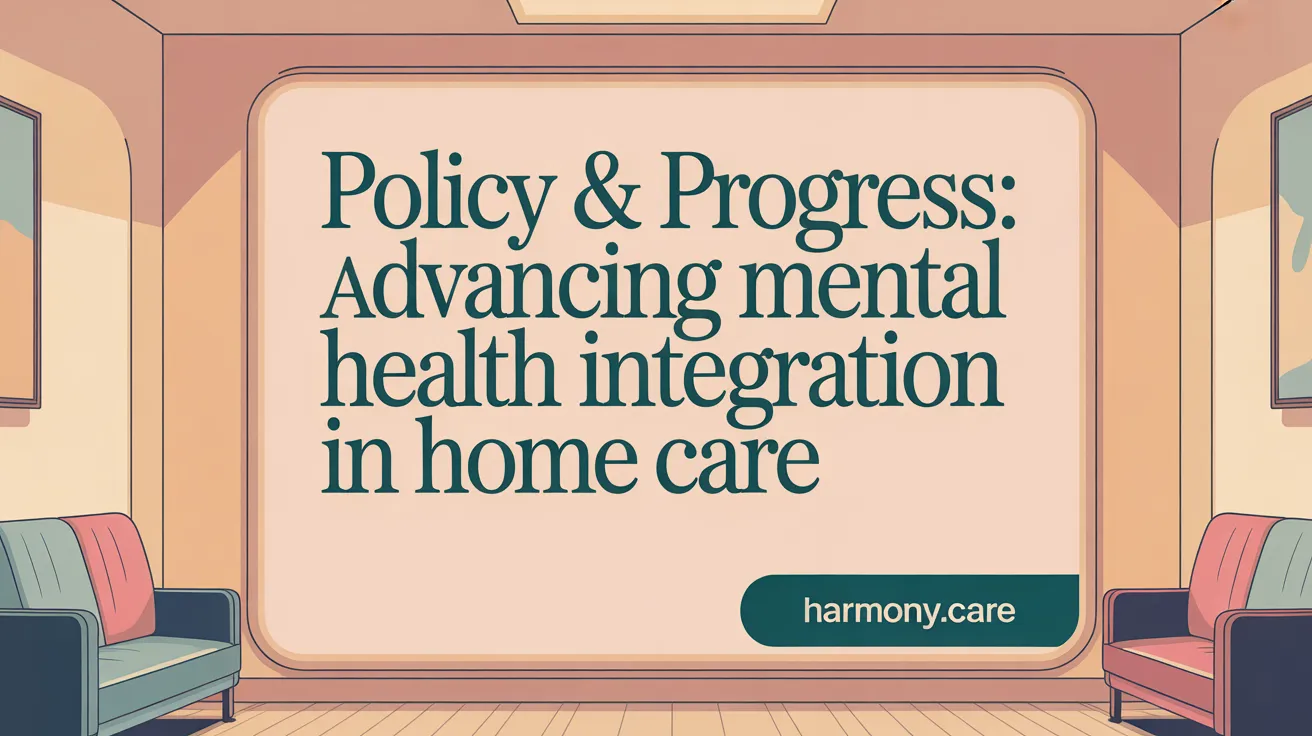Recognizing the Crucial Intersection of Mental and Physical Health at Home
Home-based care has traditionally focused on managing physical health conditions, but the growing awareness of mental health's integral role demands a new, integrated approach. Understanding why mental health support must become a fundamental aspect of home care is essential for improving patient outcomes, reducing caregiver burnout, and addressing systemic healthcare disparities. This article explores the importance, best practices, challenges, and innovative solutions for embedding mental health services within home-based care frameworks to provide truly comprehensive and patient-centered care.
The Importance of Integrating Mental Health Support into Home-Based Care
 Integrating mental health support into home-based care is vital for meeting the full spectrum of patient needs. Patients receiving care at home often face complex health challenges that encompass both physical and psychological conditions. By embedding mental health services within routine home care, healthcare providers can identify issues such as depression, anxiety, or trauma early on, facilitating timely interventions that can prevent deterioration.
Integrating mental health support into home-based care is vital for meeting the full spectrum of patient needs. Patients receiving care at home often face complex health challenges that encompass both physical and psychological conditions. By embedding mental health services within routine home care, healthcare providers can identify issues such as depression, anxiety, or trauma early on, facilitating timely interventions that can prevent deterioration.
This integration plays a crucial role in reducing feelings of loneliness and social isolation, which are prevalent among seniors and individuals with chronic illnesses. Regular mental health check-ins and social engagement activities help foster social connections, improve mood, and lower the risk of mental health crises.
Clinical outcomes are notably improved when mental health is addressed as part of comprehensive care. Models like collaborative care, involving multidisciplinary teams, have been shown to enhance symptom management and patient satisfaction while also reducing healthcare costs.
Furthermore, normalizing mental health support within home care diminishes stigma associated with mental illness. It encourages patients and caregivers to seek help without fear of judgment, fostering open conversations about mental well-being.
Overall, integrating mental health services into home-based nursing ensures holistic, personalized care that promotes recovery, resilience, and quality of life. It aligns with the objectives of equitable, accessible healthcare and supports the sustainability of health systems by preventing more severe health complications.
| Aspect | Benefits | Additional Details |
|---|---|---|
| Comprehensive patient needs | Addresses both physical and mental health | Enhances overall well-being and safety |
| Early detection | Prevents escalation of mental health issues | Uses screening tools like PHQ-9, GAD-7 |
| Reducing loneliness | Supports social engagement | Involves community programs and technology |
| Clinical outcomes | Better symptom management | Fewer hospital visits and readmissions |
| Stigma reduction | Normalizes mental health support | Integrates seamlessly into routine care |
| Personalized care | Tailors interventions to individual needs | Involves caregiver involvement and cultural competence |
Implementing mental health support within home care settings exemplifies a comprehensive approach that benefits patients, caregivers, and healthcare providers alike, ultimately leading to healthier, more connected communities.
Best Practices and Models for Mental Health Integration in Home and Community Care
Integrating mental health services into home-based and community healthcare settings requires a multifaceted approach rooted in proven practices and effective models.
One of the most recommended strategies is to adopt team-based, collaborative care models. These involve multidisciplinary teams of healthcare professionals—such as nurses, primary care physicians, psychologists, and social workers—working together to deliver comprehensive and coordinated mental health support. Such models facilitate continuous monitoring, shared decision-making, and holistic care, which are essential for addressing complex mental health needs.
Routine screening with validated tools plays a crucial role in early detection of mental health issues. Instruments like the PHQ-9 for depression and GAD-7 for anxiety enable providers to identify symptoms promptly during home visits or community interactions. Regular assessments support timely interventions and help monitor progress over time.
Developing personalized and culturally sensitive care plans enhances engagement and efficacy. Tailoring interventions to individual backgrounds, preferences, and specific mental health conditions ensures that care is respectful, relevant, and more likely to yield positive outcomes.
Training caregivers, including home health aides, is vital for sustaining mental health support at home. Equipping them with knowledge about mental health conditions, effective communication strategies, crisis intervention skills, and resilience techniques allows for better recognition of mental health issues and provides immediate support, reducing reliance on emergency services.
The utilization of telehealth technologies has bolstered access to mental health services, especially for housebound or remote populations. Video consultations, digital monitoring tools, and online psychoeducation programs can overcome barriers such as transportation difficulties and long waitlists, ensuring continuous care and support.
Models like the Patient-Centered Medical Home (PCMH), Psychiatric Collaborative Care, and Behavioral Health Homes embody integrated and comprehensive approaches. These frameworks promote coordinated care, measurement-based treatment, and patient engagement, leading to improved clinical outcomes. Incorporating structured routines, evidence-based therapies, and early intervention protocols further supports effective management of mental health conditions.
Maintaining sustainable services hinges on solid frameworks for funding, continuous staff education, establishing links with community resources, and ongoing evaluation of care quality through data collection. These practices ensure the longevity and effectiveness of mental health integration in home and community settings.
In summary, a combination of team collaboration, routine screening, personalized approaches, caregiver training, innovative technology, and robust care models constitutes the foundation for successfully integrating mental health services into home and community healthcare, ultimately improving patient well-being and reducing mental health disparities.
Overcoming Barriers: Challenges in Mental Health Integration for Home-Based Care

What challenges and barriers are commonly encountered when integrating mental health services into home-based care?
Integrating mental health services into home-based primary care presents a variety of hurdles. One significant barrier is resource limitations. Many community nursing services lack the necessary funding and infrastructure to fully incorporate mental health support. This includes a shortage of trained mental health providers and limited access to necessary technological tools.
Funding and reimbursement issues also pose major challenges. Inconsistent insurance coverage and low reimbursement rates discourage many providers from offering mental health services within home care. This financial barrier hampers sustainability and the long-term adoption of integrated models.
Stigma and privacy concerns are prevalent obstacles as well. Persistent stigma around mental health can reduce patient willingness to engage in psychological interventions. Additionally, privacy concerns during remote consultations, especially in shared or unsecured home environments, may hinder open communication and confidentiality.
Organizational and systemic problems compound these issues. Healthcare systems often operate in silos, with poor coordination between physical and mental health services. This fragmentation leads to disjointed care, delays in referrals, and limited communication among providers.
Technological and organizational challenges are also notable. Limited access to reliable internet, devices, and user-friendly telehealth platforms restrict the delivery of virtual mental health support. Moreover, insufficient training for community nurses on mental health issues and digital tools can reduce service effectiveness.
Addressing these complex barriers requires a coordinated effort. Strategies include increasing funding allocations, developing diversified reimbursement models, enhancing technological infrastructure, reducing stigma through education, and strengthening interprofessional collaboration. Leadership at all levels is crucial to foster environments where mental health support becomes a routine part of home-based care.
Effective Strategies and Techniques for Delivering Mental Health Support in Home Care
What strategies and techniques can support effective mental health care delivery within home-based care settings?
Providing mental health support through home-based nursing services hinges on a multifaceted approach tailored to individual needs and circumstances. One vital component is comprehensive caregiver training and education. Caregivers should be equipped with the skills to recognize symptoms of common mental health issues, such as depression, anxiety, and social withdrawal, enabling early detection and timely intervention.
Empathetic communication plays a crucial role in fostering trust and understanding. Techniques like active listening and the LEAP method—listen, empathize, assess, and plan—help caregivers engage effectively with patients, creating a safe space for expressing concerns.
The integration of telehealth and online support resources broadens access to mental health services, especially important for homebound patients. Virtual appointments, online support groups, and digital monitoring tools facilitate ongoing care, reduce barriers like transportation, and enable rapid response to emerging issues.
Establishing routines and engaging patients in cognitive and physical activities contribute to mental resilience. Activities such as mental exercises, structured daily schedules, and social interactions—whether virtual or through community programs—help mitigate feelings of isolation and anxiety.
Family engagement and efforts to reduce stigma are critical. Educating families about mental health fosters supportive environments and encourages open dialogue, which can significantly improve outcomes. Cultural competence in care delivery ensures interventions are respectful of individual backgrounds, promoting acceptance and adherence.
Finally, individualizing care plans and emphasizing culturally sensitive practices empower patients. Personalized approaches that consider cultural, social, and personal preferences result in more effective and acceptable interventions.
Supporting effective mental health care in home settings requires a coordinated effort involving training, empathetic communication, technology, social engagement, and personalized care, all aimed at improving emotional well-being alongside physical health.
Roles and Responsibilities of Healthcare Providers in Home-Based Mental Health Support

What roles and responsibilities do healthcare providers have in delivering mental health support in home care?
Healthcare providers in home-based settings play a vital role in supporting the mental health of patients. Their responsibilities include conducting thorough mental health assessments and screenings to identify issues like depression, anxiety, or social isolation. Tools such as PHQ-2, PHQ-9, or GAD-7 are often used to detect early signs of mental health conditions.
Once identified, providers develop personalized care plans that combine medical, psychological, and social strategies. This integrated approach ensures that mental health support is tailored to each patient’s needs, promoting better outcomes and well-being.
Coordination with a multidisciplinary team is essential. Nurses, social workers, mental health specialists, and home health aides work together to provide comprehensive care. Providers also oversee medication management, ensuring adherence and monitoring side effects.
Education forms a core part of their role. They inform patients and families about mental health conditions, treatments, and coping mechanisms. This knowledge empowers patients and helps reduce stigma associated with mental illness.
Social engagement is promoted to combat loneliness and social withdrawal, which are common in homebound individuals. Providers facilitate activities and community connections that support emotional health.
Supporting caregivers is another priority. Caregivers often face burnout and stress, impacting their ability to support the patient. Providers offer guidance, resources, and emotional support to help caregivers manage their responsibilities.
Addressing stigma and managing mental health crises are ongoing tasks. Providers create a safe environment for open discussion and are prepared to intervene promptly during crises, ensuring patient safety.
Overall, healthcare providers' proactive involvement in mental health support helps maintain independence, enhances quality of life, and fosters a holistic approach to home-based care.
Harnessing Telehealth and Digital Interventions to Enhance Home-Based Mental Health Care

How can telehealth and online interventions enhance mental health support in home-based care?
Telehealth and digital tools are transforming mental health support in home-based settings by making services more accessible, especially for populations in rural or underserved areas. These technologies include video conferencing platforms, mobile health apps, and messaging services that facilitate ongoing communication between patients and healthcare providers.
One of the main advantages is their ability to offer timely, continuous care. Patients can receive therapy, counseling, or crisis interventions without needing to travel to clinics, which is particularly beneficial for those with mobility challenges or social stigmas associated with mental health treatment.
These innovations also support remote monitoring of mental health symptoms, allowing providers to track patient progress and adjust treatment plans as needed. During the COVID-19 pandemic, the rapid expansion of telehealth demonstrated its practicality and effectiveness, with many studies showing similar outcomes to traditional in-person care.
Furthermore, telehealth helps address workforce shortages by extending the reach of mental health specialists, enabling collaboration with primary care providers and community nurses. This integrated approach reduces gaps in care and ensures that patients receive comprehensive support.
Despite the benefits, barriers such as technological access, digital literacy, and reimbursement policies remain. To sustain these services, investment in infrastructure, clear regulations, and ongoing provider training are essential. As these barriers are addressed, telehealth has the potential to significantly improve mental health outcomes in home-based care settings, ensuring broader, equitable access to vital services.
Addressing Disparities to Ensure Equitable Mental Health Access in Home Care
How can disparities in access to mental health services in home care be addressed to ensure equity?
Addressing disparities in mental health care within home-based nursing services requires a comprehensive, multi-layered strategy. First, it is essential to promote cultural competence among healthcare providers. Tailoring care approaches to respect diverse cultural backgrounds helps bridge trust gaps and improves engagement, especially among underserved populations.
Expanding infrastructure, notably through telehealth and telemedicine technologies, plays a vital role. These tools can mitigate geographical barriers, making mental health support accessible in rural and remote areas. Telehealth not only increases reach but also facilitates continuous, real-time consultation, overcoming logistical constraints.
Policy reforms focusing on insurance parity are also crucial. Ensuring mental health services are covered equally under health insurance plans encourages utilization and reduces financial barriers. Additionally, diversifying the healthcare workforce by training more mental health professionals from minority backgrounds can improve cultural sensitivity and patient comfort.
Community outreach initiatives that focus on education and stigma reduction significantly influence service utilization. Public awareness campaigns and involving community leaders can foster trust and dispel misconceptions about mental health.
Furthermore, integrating mental health services into primary care settings enhances early detection and intervention, promoting holistic treatment approaches. Data collection and analysis should support targeted strategies, enabling services to adapt to specific community needs.
In conclusion, tackling disparities involves improving technological infrastructure, implementing inclusive policies, increasing workforce diversity, engaging communities, and embedding mental health within primary care. Such integrated efforts are vital for creating equitable mental health access in home-based care systems.
Policy Landscape and Research Foundations Driving Mental Health Integration at Home

What are the key policy considerations and recent progress regarding the integration of mental health into home-based healthcare?
Efforts to embed mental health services into home-based care in the UK and beyond hinge on supportive policies that ensure sustainable funding, effective reimbursement models, and flexible regulatory frameworks. A major recent development is California’s CalAIM initiative, which promotes comprehensive, whole-person care, aiming to improve coordination across health services, including mental health.
In addition, policies like the 'No Wrong Door' approach work to streamline access to various services for vulnerable populations, including those with mental health needs. Incorporation of standardized screening tools and mobile crisis services are steps toward better early detection and crisis management.
On the federal level, strategies from the U.S. Department of Health and Human Services (HHS) and the Centers for Medicare & Medicaid Services (CMS) foster integration efforts. These include creating pathways for collaboration between physical and behavioral healthcare providers but face hurdles due to regulatory and funding constraints.
Progress also involves workforce development and culturally responsive services, ensuring providers are trained to deliver equitable care, especially for underserved populations. Despite these advancements, ongoing legislative and budgetary challenges—such as potential cuts to mental health programs or restrictive regulations—pose risks to the expansion and sustainability of integrated home-based mental health services.
Tables for quick overview:
| Policy Aspect | Recent Initiatives & Progress | Challenges & Future Outlook |
|---|---|---|
| Funding & Reimbursement | California's CalAIM, CMS payment reforms | Potential cuts, regulatory restrictions |
| Telehealth Support | Federal telehealth policies expanded during COVID-19, ongoing regulatory adjustments | Maintaining coverage, cross-state licensure issues |
| Workforce & Cultural Response | Training programs, culturally sensitive care initiatives | Ensuring workforce capacity, addressing social determinants |
| Implementation Strategies | Use of collaborative care models, measurement-based care | Scaling models, resource allocation |
What insights and research methodologies aid in implementing mental health support within home and elderly care?
Research in this area employs various methodologies designed to understand effective integration practices. Longitudinal studies and randomized controlled trials, such as FINGER and MAPT, have shed light on early detection and personalized intervention strategies for elderly mental health issues.
Frameworks from implementation science guide the process of adopting mental health services in real-world settings. Approaches include stakeholder engagement, process evaluations, and adaptation of models like the Collaborative Care Model (CoCM) and Primary Care Behavioral Health (PCBH), which emphasize team-based, measurement-driven care.
Technology plays a central role, with telepsychiatry and digital health tools facilitating service delivery and data collection across geographical barriers. Additionally, training programs for caregivers and providers help reduce stigma and improve engagement.
Although research progress is promising, questions around cost-effectiveness and organizational impact remain. Future studies will need to evaluate how these evidence-based interventions can be scaled sustainably and tailored to diverse populations.
To summarize, multisectoral collaboration, rigorous research methods, technological integration, and ongoing training are essential in advancing mental health implementation in home and elderly care settings.
Toward Sustainable, Inclusive Mental Health Integration in Home Care
Integrating mental health support into home-based care is a complex but essential endeavor to ensure holistic health outcomes for patients and their caregivers. By embracing proven collaborative care models, addressing systemic barriers, leveraging telehealth innovations, and committing to equitable access, healthcare systems can create sustainable structures that benefit all stakeholders. Ongoing research and policy support remain critical to advancing this integration and achieving parity between physical and mental health care in home settings. Ultimately, placing mental health on equal footing within home-based care fosters improved quality of life, patient autonomy, and a resilient caregiving community poised to meet the challenges of a growing and diverse patient population.
References
- Integrating mental health care into home-based nursing ...
- Mental Health Support in Home Care
- The Role of Home Health Care in Mental Health Support
- Integrating Mental Health into Whole-Person Care
- How to Incorporate Behavioral Health Techniques in Home ...
- Integrating mental health into primary healthcare - PMC
- Using telehealth to integrate behavioral health and primary ...
- Understanding integrated behavioral health care and the ...
- The Growing Importance of Mental Health Support ...
- Integrating mental health care into home‐based nursing ...
